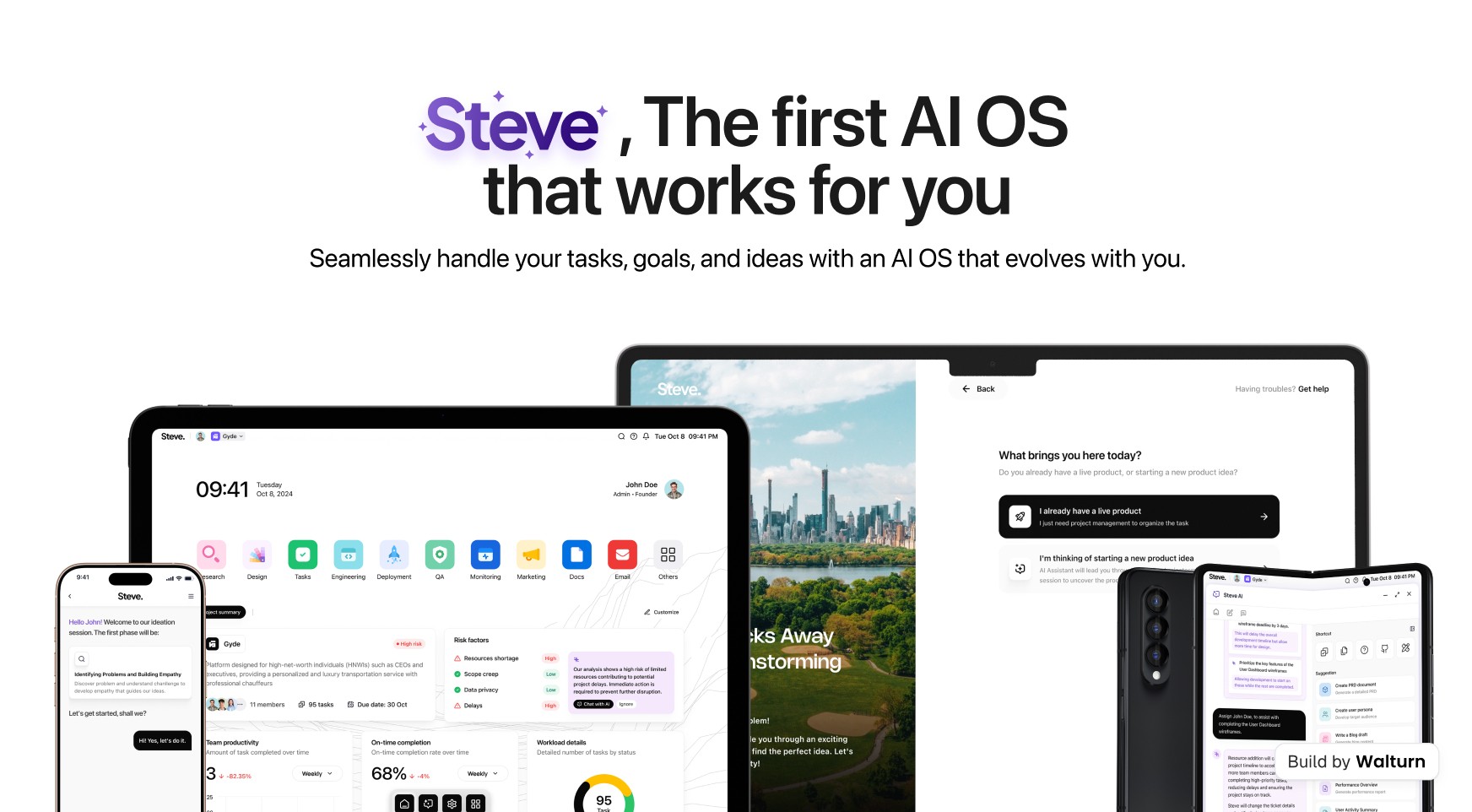Unlocking the Potential of Vertical AI Agents: A Comparative Analysis
Summary
Vertical AI agents are specialized AI systems designed for specific industries, offering superior accuracy and efficiency compared to generalist AI. This analysis examines 12 leading providers (including Decagon, Sierra, and Replit) across technical capabilities, pricing, and integration features. The insight also introduces Steve, an AI Operating System that unifies these vertical agents into a cohesive ecosystem.
Key insights:
Domain Specialization Strategy: Vertical AI agents combine industry expertise with ML techniques, addressing complex sector-specific challenges that generalist AI cannot effectively solve.
Market Differentiation: Among the 12 providers analyzed, each serves distinct niches - from Decagon's data analytics to Harvey's legal tech focus, demonstrating the breadth of vertical AI applications.
Technical Architecture: Context awareness and response quality vary significantly, with providers like Perplexity and Harvey showing superior performance in complex query handling and domain-specific outputs.
Pricing Complexity: Pricing models range from transparent tiered structures (Replit, MultiOn) to enterprise-focused custom pricing (Decagon, Harvey), with hidden costs often tied to integration and support.
Integration Capabilities: All providers offer API integration, but with varying levels of flexibility and complexity, impacting their ability to mesh with existing enterprise systems.
Steve's Unifying Role: Steve functions as an AI Operating System that coordinates multiple vertical AI agents, enabling seamless collaboration between specialized tools and traditional systems while adapting to evolving technological needs.
Introduction
Vertical AI agents are customized systems created to solve domain-specific problems with unmatched accuracy and efficiency as a result of artificial intelligence's quick development. In contrast to their generalist equivalents, vertical AI agents use in-depth subject knowledge to provide customized solutions that revolutionize sectors by satisfying extremely specific business needs. These agents are becoming essential instruments for innovation and competitive differentiation as businesses place a greater emphasis on accuracy and speed in their workflows. By delivering a thorough comparative analysis of top AI suppliers, this article seeks to investigate the revolutionary potential of vertical AI agents and provide insights to assist organizations in finding solutions that meet their particular operational needs and strategic objectives.
The increasing focus on vertical AI signifies a paradigm shift in the field of artificial intelligence, moving away from one-size-fits-all models and toward solutions that are specifically designed to meet the needs of particular industries. Despite its versatility, generalized AI frequently fails to meet the complex needs of industries like manufacturing, retail, healthcare, and finance. By combining cutting-edge machine learning methods with domain knowledge, vertical AI agents close this gap and help businesses solve complex problems with more precision, effectiveness, and scalability. This paper highlights the strategic benefits of using vertical AI solutions by exploring the relative advantages of leading AI providers and highlighting their contribution to industry-specific innovation.
Definition and Role in the AI Ecosystem
1. Overview of Vertical AI Agents
Specialized artificial intelligence systems called "vertical AI agents" are painstakingly created to meet the unique requirements of particular sectors or roles. Vertical AI agents concentrate on combining domain expertise, customized datasets, and specialized algorithms to address the complex problems specific to certain industries, in contrast to generalist AI platforms that seek to serve a wide range of applications. Beyond simply automating repetitive operations, these agents are strategic enablers that help sectors like engineering, sales, legal, and customer service reach greater levels of accuracy, productivity, and scalability.
Key Players in the Ecosystem
Innovative suppliers who provide unique solutions suited to particular company needs are shaping the emerging vertical AI ecosystem. Twelve well-known companies in the industry are highlighted in this article: Decagon, Sierra, Replit, Perplexity, Harvey, MultiOn, Cognition, Factory, All Hands, Dosu, Lindy, and 11x. Each of these companies is a prime example of how vertical AI may revolutionize their respective fields.

Each of these suppliers is a perfect example of how vertical AI agents are becoming increasingly significant in their target industries, altering customer engagement, operational efficiency, and strategic decision-making. Together, they support a quickly developing AI ecosystem that prioritizes accuracy, flexibility, and industry relevance, laying the groundwork for a time when specialized AI solutions will be essential to corporate success.
Comparative Technical Analysis
1. Capabilities and Specializations
It is evident from analyzing the technical prowess and areas of expertise of the 12 vertical AI providers that are highlighted—Decagon, Sierra, Replit, Perplexity, Harvey, MultiOn, Cognition, Factory, All Hands, Dosu, Lindy, and 11x—that each company has established a distinct niche within the larger AI ecosystem. By utilizing specialized technology, domain knowledge, and differing degrees of integration flexibility, these suppliers set themselves apart. This section looks at their advantages and disadvantages in relation to important factors including supported use cases, API integrations, response quality, and context awareness.
2. Context Awareness
Context awareness is a critical criterion for vertical AI agents, assessing their capacity to comprehend intricate queries and provide precise, pertinent results. Because of their reliance on domain-specific datasets and sophisticated natural language processing (NLP), providers like Perplexity and Harvey are excellent in this field. Perplexity, for instance, exhibits remarkable flexibility by correctly reading user intent across a variety of query patterns. Similarly, by using pre-trained models on legal texts, Harvey's legal AI tools improve their contextual awareness for activities like contract analysis and case law reviews.
On the other hand, because of their more controlled operating environments, Replit and Factory, although skilled in their respective fields of industrial automation and software engineering, demonstrate comparatively less competence in managing intricate, context-dependent interactions. Comparatively speaking to rivals like Perplexity, Dosu, which concentrates on sales optimization, provides strong data-driven customization but falls short in conversational richness and contextual adaptation.
3. Response Quality
Response quality, which is a gauge of output relevance and correctness, differs greatly amongst the mentioned providers. With its emphasis on knowledge management, Lindy produces outputs that are extremely precise and structured, guaranteeing consistency in the dissemination of information. Decagon, which is well-known for its data analytics skills, does well in this category as well, providing perceptive assessments that aid in decision-making.
However, the domain's specificity affects the quality of the responses. It could be difficult for providers like Cognition, which focus on multi-sector applications, to match the level of accuracy of highly specialized agents like Harvey or Perplexity. Dosu exhibits inconsistency in response quality when addressing out-of-scope inquiries, indicating limitations in generalization, despite its effectiveness in sales-related outputs.
4. API Integration
The foundation of vertical AI agents' accessibility and adaptability is API integration, which enables companies to easily incorporate these technologies into their current processes and systems. Decagon, Sierra, Replit, Perplexity, Harvey, MultiOn, Cognition, Factory, All Hands, Dosu, Lindy, and 11x are among the featured providers that provide APIs, guaranteeing varied levels of flexibility to satisfy the various demands of their customers.

All things considered, all 12 vendors show a solid dedication to API integration, guaranteeing that their products may be tailored to a variety of corporate contexts and needs. Their APIs enable businesses to successfully utilize vertical AI capabilities, increasing productivity and scalability in a variety of industries.
Supported Use Cases
Another important consideration is the range of use cases that are supported. With its focus on industrial automation, Factory offers a small number of applications that have a significant impact, particularly in areas like production optimization and predictive maintenance. Similar to this, All Hands targets a more specific yet well-defined user base and concentrates on workforce management and collaboration.
However, suppliers such as 11x and Cognition show wider application. While 11x focuses on creative approaches catered to emerging industries, including those in banking, healthcare, and education, Cognition provides multi-sector analytics and decision-making tools. Their wide range of applications makes them flexible choices for companies looking for AI solutions with several applications.
5. Key Metrics Table
A thorough comparison of important metrics, such as context awareness, response quality, API integrations, and supported use cases, is shown in the table below.

Businesses can decide which AI solutions best suit their unique needs and operational objectives by looking at five important criteria.
Commercial Analysis
1. Pricing Models and Accessibility
Given their distinct target markets, use cases, and degrees of expertise, the 12 vertical AI providers that are highlighted have a wide range of price structures and accessibility. By striking a balance between affordability and cutting-edge capabilities, each provider's pricing approach provides insights into their intended market positioning. These price structures are examined in this section, along with any hidden expenses or complications that can affect their uptake.
1. Decagon
Decagon does not disclose its prices, which implies that it mainly caters to businesses or companies who are prepared to work out special deals. Although this strategy might provide customized solutions, smaller companies looking for fixed prices or simple subscription models might be put off by the lack of transparency. It is also difficult to evaluate Decagon's offerings' total value proposition because its prices are not publicly revealed.
2. Sierra
Although specific pricing information is not made public, Sierra has a subscription-based business model with usage-based costs. According to reports, the company's price is flexible enough to accommodate businesses of all sizes because it is made to scale with usage. However, for high-usage clients, this strategy could result in extra expenses like overage fees or the requirement for premium support tiers. Companies thinking about Sierra should thoroughly assess its anticipated consumption to prevent unforeseen costs.
3. Replit
From individual developers to large teams, Replit provides a tiered price structure to meet the needs of a wide range of users. The Starter plan is a great choice for novices because it is free, but it has a lot of drawbacks, like restricted access to AI and community assistance. With limitless projects, $25 in monthly usage credits, and access to cutting-edge AI tools like Claude Sonnet 3.5 and OpenAI GPT-4, the $15/month (yearly) Core plan improves accessibility. Replit has a Teams plan for teams that includes additional monthly credits, role-based access management, and centralized invoicing; however, the precise annual pricing is yet unknown. Advanced security and support features like SSO and SCIM are promised by the future Enterprise plan, although they are probably going to cost more tailored to large scale operations.
4. Perplexity
Perplexity charges both fixed and variable costs according to input and output tokens, using a usage-based pricing approach. Pricing varies based on token consumption, with complex models costing up to $5 per million tokens. The starting price is $5 per 1,000 requests. Businesses with low to moderate consumption can use Perplexity thanks to its structure, but those who need high-volume processing may find it expensive. Although the pricing's flexibility and transparency are alluring, companies must carefully control token consumption to minimize expenses.
5. Harvey
Similar to Decagon, Harvey does not make its prices available to the general public, indicating that the company focuses on enterprise clients who need specialized solutions. This lack of openness may make it difficult for prospective buyers to assess the tool's worth and affordability. Negotiations for customized pricing, which can include additional costs for specialized support or comprehensive integrations, should be expected by businesses interested in Harvey.
6. MultiOn
Starting with a Starter plan that grants free access to 40 daily queries, MultiOn offers transparent and adjustable price tiers. With 400 inquiries each day, faster AI modes, and priority support, the $19/month Pro package is appropriate for individual professionals. While the Enterprise plan enables unlimited queries and bespoke integrations for a flexible price, the Business plan, which costs $99 per month, gives corporations professional assistance and raises the query limit to 1,000 per day. These tiers offer scalability, but because of the bespoke features and premium support requirements, businesses who need a high degree of customization may incur additional expenditures.
7. Cognition
The pricing information for Cognition is still unclear, which restricts openness for prospective clients. Its emphasis on complex analytics and multi-sector applications raises the possibility that its price is geared toward enterprise clients, with additional fees for premium services, integrations, and support.
8. Factory
Although specifics are not revealed, the factory's pricing is set up to appeal to industrial clients. A concentration on negotiated contracts, possibly involving extra payments for services like quality control systems or predictive maintenance, is implied by this lack of transparency. Depending on their operational scale, businesses thinking about implementing Factory should factor in potential overage fees or integration charges.
9. All Hands
With its $80 per person per month Team package, which offers centralized invoicing, up to 50 users, and a comprehensive feature set including indexed repositories and advanced reasoning tokens, All Hands seems to be aiming its pricing strategy at collaborative teams. Although its cost necessitates direct consultation, the Enterprise plan offers enhanced features like unlimited repositories and SSO. Smaller businesses could be put off by the comparatively expensive cost per user, while larger teams find the sophisticated communication capabilities to be worth the investment.
10. Dosu
Dosu has a free Community plan that supports public repositories and allows up to 500 requests per month. Dosu offers enterprise clients private repositories, limitless requests, and round-the-clock assistance along with customized pricing. Its attractiveness to mid-sized organizations may be limited by the lack of mid-tier pricing between the free and enterprise alternatives. Furthermore, businesses that need special features or API interfaces may have to pay extra, which would limit Dosu's appeal to customers on a tight budget.
11. Lindy
Lindy caters to modest users with basic needs by offering a Free plan with 400 monthly credits. Although specific price is not provided, the organization seems to offer custom solutions for more complex applications. Larger businesses may incur higher costs because of bespoke integrations or increased maintenance requirements, but the free credits offer an accessible entry point.
12. 11x
With a base package apparently starting at $5,000 per month for 3,000 contacts, 11x is an expensive service. Its emphasis on sophisticated use cases and major enterprise clients is reflected in its premium price. Even while this approach allows for a great deal of customization, smaller companies or organizations assessing the platform for the first time may find the high expenses to be unaffordable. Unexpected fees like per-email fees ($1.67 each email) could drive up costs even more, especially for clients who need extensive outreach.
13. Hidden Costs and Considerations
All in all, a number of suppliers present possible unstated expenses, such as overage fees, premium support fees, and integration challenges. For example, high-volume users may incur unforeseen costs due to Perplexity's token-based pricing and Sierra's usage-based fees. Similarly, negotiating for additional features—which may incur extra fees—is frequently necessary for enterprise-level plans like those provided by Replit, MultiOn, and All Hands.
To prevent unanticipated expenses, organizations assessing these providers should carefully consider their unique requirements, anticipated usage, and financial limits. While Replit and MultiOn's transparent pricing structures offer clarity, Decagon's and Harvey's opaque models necessitate diligence in comprehending the complete cost of ownership.
Cost-Benefit Analysis
1. Cost Efficiency
There are significant differences in the pricing structures of the 12 vertical AI providers, each of which offers unique cost and ROI trade-offs. Cost effectiveness is a crucial consideration when choosing the best solution because each provider's model accommodates different company sizes and operational requirements.
Transparent tiered pricing is provided by providers like Replit and MultiOn, enabling organizations to increase use economically. While Replit is Teams and future Enterprise plans scale price and capabilities to fit team and organizational needs, its Core plan, which costs $15 per month and is billed annually, offers a comprehensive feature set for independent developers. Similar to this, MultiOn's Pro plan, which costs $19 a month, provides enhanced capabilities for individuals, while its Business plan, which costs $99 a month, offers premium assistance and larger query limitations.
On the other hand, suppliers like 11x, whose base price starts at $5,000 a month, cater to enterprise clients with large budgets and intricate needs. 11x's high-volume outreach capabilities and customized solutions make it a cost-effective investment for large-scale operations, but its high cost may put off small and mid-sized firms.
There is ambiguity for providers such as Decagon and Harvey due to the absence of publicly published pricing. These providers most typically use unique pricing structures designed for large businesses, where the substantial value gained from accurate, domain-specific solutions can more than outweigh the high cost.
Usage-based solutions, like Perplexity, scale fees depending on token usage, striking a compromise between cost and flexibility. Businesses with predictable or modest processing need to profit from this arrangement, while high-volume customers may find it expensive. In a similar vein, Sierra's use-based subscription model matches prices to consumption; however, extra charges for overages or premium assistance could drive up costs.
Reimagining Vertical AI with Steve's Unifying Framework

Steve, as an AI Operating System (AI OS), aims to revolutionize the way specialized agents like Decagon, Perplexity, and Sierra collaborate and integrate with larger systems. Steve's method breaks down the barriers between AI-driven solutions and conventional tools by establishing itself as a unifying framework that smoothly connects various Vertical AI agents.
Steve functions as an AI operating system that coordinates and unifies the actions of several Vertical AI agents. For example, Steve can serve as the basic system that recognizes Sierra, links it to complementing agents, and enables their cooperation, even though Sierra may be an expert in legal case analysis. In addition to Sierra's analysis, a legal case may also need Perplexity's conversational assistance and Decagon's data insights. Steve makes sure that these agents collaborate well, establishing a streamlined process that maximizes their combined potential.
Steve's design integrates non-AI resources like CRM systems, project management software, and conventional databases, allowing Vertical AI bots to function together, unlike segregated platforms. Cross-functional processes are made possible by this capacity. Steve could easily combine Decagon for data visualization, MultiOn for operational job assignments, and Sierra for case law analysis in a legal workflow automation scenario, resulting in a unified process from client reporting to legal research. Similar to this, Steve may use the advantages of Lindy for knowledge management and Factory for predictive maintenance. Additionally, Steve's AI OS uses conversational interfaces to help users find and use the best AI agents for their jobs. Steve intelligently decides which AI agents to leverage for any user request and effectively combines several tools to provide an accurate output for the user - allowing it to produce the best outcome no matter the industry. In a financial audit scenario, for example, Steve might use Harvey to examine contracts and compliance paperwork, Cognition to predict market trends, and All Hands to coordinate and report as a team. This establishes an all-encompassing and cooperative ecosystem in which each agent's potential is enhanced by their interdependence within a strategic framework.
Steve is at the vanguard of AI innovation because of its ability to continuously adapt and alter in response to user needs, going beyond simple integration. By using a modular design, Steve can incorporate state-of-the-art Vertical AI agents and tools into its ecosystem, ensuring that consumers always have access to the newest solutions. Whether integrating a new data visualization tool or a complex NLP agent, Steve's architecture ensures seamless collaboration without interfering with ongoing operations. Steve's adaptability makes it more than just a static operating system; rather, it is a dynamic ecosystem that evolves and adapts to changing market conditions and technological advancements.
Conclusion
Vertical AI agents are becoming transformative tools that are transforming how industries address certain issues with tailored, domain-specific solutions. Because of their ability to integrate state-of-the-art machine learning with in-depth industry knowledge, they have become essential tools for companies seeking accuracy, efficacy, and scalability. This comparative analysis has demonstrated that each provider in the ecosystem has unique capabilities that address a range of business demands, from the all-inclusive, enterprise-focused solutions of 11x, Decagon, and Harvey to the reasonably priced and adaptable options of Replit and MultiOn.
An important turning point in the history of artificial intelligence has been reached with the creation of vertical AI. By bridging the gap between industry-specific requirements and universal platforms, these agents enable businesses to innovate, streamline operations, and preserve a competitive advantage. As long as companies continue to embrace these technologies, vertical AI is predicted to play an increasingly prominent role in shaping the character of work in the future, enhancing operational performance, and enacting major, industry-wide changes.
Steve, as a unifying AI Operating System, amplifies this revolution by integrating the capabilities of specialized agents into a cohesive ecosystem. Vertical AI solutions may operate together seamlessly thanks to its dynamic foundation, which opens up new possibilities for creativity and synergy. Steve guarantees that companies may fully benefit from the revolutionary potential of vertical AI while maintaining their agility in a quickly changing technological environment by acting as a central hub for AI tools and conventional systems.
Authors
Transform Your Product Engineering with AI
Looking to streamline your product development process? Steve combines AI-powered engineering assistance, intelligent product management, and seamless deployment capabilities all in one platform. Whether you're a startup founder, product manager, or enterprise team, discover how Steve can accelerate your product development journey.
References
“11X – Digital Workers, Human Results.” Www.11x.ai, 2024, www.11x.ai.
“All Hands AI.” All-Hands.dev, 2025, www.all-hands.dev/.
cognition.ai. “Cognition.” Cognition.ai, www.cognition.ai/.
“ContentKeeper Content Filtering.” Dosu.dev, 2025, dosu.dev/.
“Decagon.” Decagon, 2025, decagon.ai/.
“Factory.” Factory.ai, 2024, www.factory.ai/.
“Harvey | Generative AI for Elite Law Firms.” Www.harvey.ai, www.harvey.ai/.
“Lindy.ai — Meet Your AI Employee.” Www.lindy.ai, www.lindy.ai/.
“MultiOn AI.” MultiOn AI, 1 Apr. 2024, www.multion.ai/.
“Perplexity AI.” Www.perplexity.ai, 2024, www.perplexity.ai/.
replit. “Replit AI - Code Faster with AI.” Replit, replit.com/ai.
“Sierra - the Conversational AI Platform.” Sierra, 2025, sierra.ai/.
















































